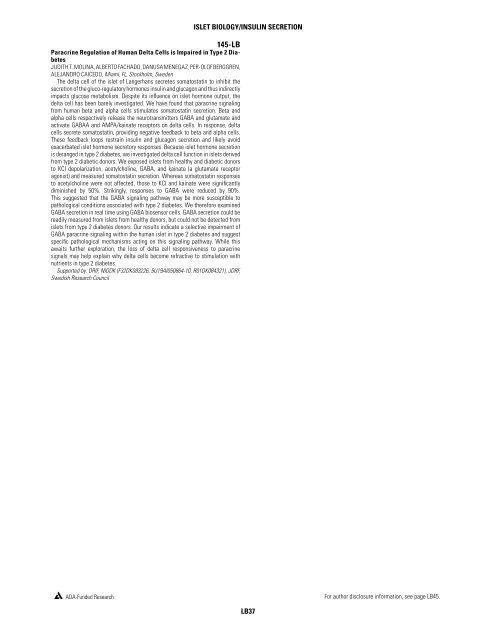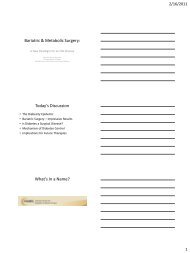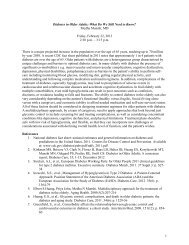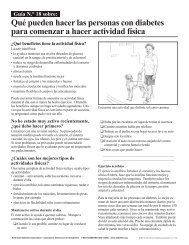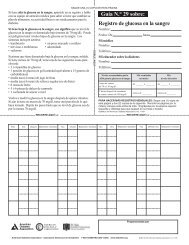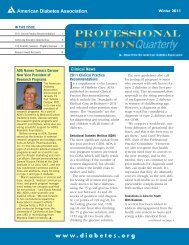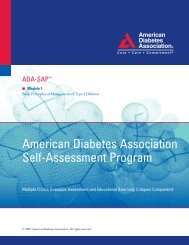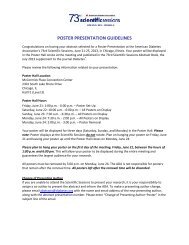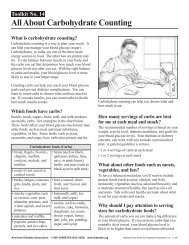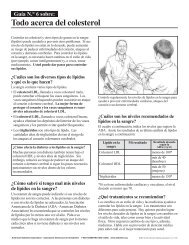Islet Biology/Insulin SecretionIslet Biology—Beta Cell—Stimulus-Secretion Coupling andMetabolism141-LBSelective Activation <strong>of</strong> Gq Signaling in Pancreatic Beta Cells InVivo Improves Beta Cell Function and Whole Body Glucose HomeostasisSHALINI JAIN, INIGO RUIZ DE AZUA, MORRIS WHITE, JEAN MARC GUETTIER,JURGEN WESS, Be<strong>the</strong>sda, MD, Boston, MAImpaired function <strong>of</strong> pancreatic beta-cells is one <strong>of</strong> <strong>the</strong> hallmarks <strong>of</strong>type 2 diabetes (T2D). Beta-cell function is modulated by various nutrients,hormones and neurotransmitters most <strong>of</strong> which act through G-protein coupledreceptors (GPCRs). Pancreatic beta cells express many GPCRs which are linkedto different functional classes <strong>of</strong> heterotrimeric G proteins including Gq. Inorder to be able to selectively stimulate beta-cell Gq signaling in vivo, wegenerated transgenic mice that expressed a Gq-coupled designer GPCR (Rq)in pancreatic beta-cells only (b-Rq mice). Importantly, this designer receptorcan only be activated by an exogenously administered drug, clozapine-Noxide(CNO), an o<strong>the</strong>rwise pharmacologically inert compound. Prolongedactivation <strong>of</strong> beta-cell Gq signalling by chronic CNO treatment <strong>of</strong> b-Rq micewas associated with elevated serum insulin and decreased blood glucoselevels, increased pancreatic insulin content, increased beta-cell mass and rate<strong>of</strong> beta-cell proliferation, and elevated expression <strong>of</strong> several genes importantfor <strong>the</strong> maintenance <strong>of</strong> beta-cell function and mass, including IRS-2 and <strong>the</strong>transcription factors Pdx1, MafA, NeuroD1 and Ngn3. Chronic activation <strong>of</strong>beta-cell Gq signalling also protected b-Rq mice against hyperglycemia andglucose intolerance induced by consumption <strong>of</strong> a high-fat diet or treatmentwith low doses <strong>of</strong> streptozotocin. Studies with b-Rq-mice lacking IRS2 stronglysuggested that IRS2 plays a central role in mediating <strong>the</strong> beneficial metaboliceffects resulting from prolonged activation <strong>of</strong> beta-cell Gq signalling. In vitrostudies demonstrated that <strong>the</strong> enhanced expression <strong>of</strong> IRS-2 triggered byactivation <strong>of</strong> beta-cell Gq signaling required PKC-dependent ERK activation.These results suggest that agents aimed at enhancing Gq signaling inpancreatic beta-cells could become clinically useful as antidiabetic drugs.142-LBGABA Secretion from Human Pancreatic Islets is PulsatileDANUSA MENEGAZ, RAYNER RODRIGUEZ-DIAZ, PER-OLOF BERGGREN,STEPHEN D. ROPER, ALEJANDRO CAICEDO, Miami, FL, Stockholm, SwedenGamma-aminobutyric acid (GABA) is found in high concentrations in <strong>the</strong>endocrine pancreas, <strong>the</strong> islets <strong>of</strong> Langerhans. It is generally believed thatGABA is a paracrine signal regulating insulin and glucagon secretion. It is notknown, however, what cells within <strong>the</strong> islet release GABA, what stimulates itsrelease, and how it is secreted. Here we used CHO cells expressing GABABreceptors (GABA biosensors) to record GABA secretion from isolated humanislets in real time. Islets were placed on a layer <strong>of</strong> GABA biosensors loadedwith <strong>the</strong> Ca2+ indicator Fura 2. GABA secretion was detected by performingCa2+ imaging <strong>of</strong> GABA biosensors. In <strong>the</strong> presence <strong>of</strong> islets, GABA biosensorsshowed repeated periods <strong>of</strong> activation, indicating pulsatile GABA secretion.The periods depended on <strong>the</strong> human islet preparation and ranged from 4 to18 minutes, with an average <strong>of</strong> 9 minutes. GABA biosensor responses wereblocked by CGP55845 (10 uM), a GABAB receptor antagonist, demonstratingthat biosensors detected GABA. Changing <strong>the</strong> glucose concentration (1, 3, 11mM), a major stimulus for islet endocrine cells, did not produce changes in <strong>the</strong>amplitude and frequency <strong>of</strong> GABA release. To test for <strong>the</strong> source <strong>of</strong> GABA, wesorted beta and alpha cells from human islets and placed <strong>the</strong>m on biosensors.In <strong>the</strong> presence <strong>of</strong> beta cells, but not <strong>of</strong> alpha cells, biosensors recorded robustGABA secretion that also showed a pulsatile pattern. To determine that GABAmetabolism is directly coupled to GABA secretion, we applied allylglycineto inhibit glutamate decarboxylase (GAD), <strong>the</strong> main enzyme producing GABA.This reduced both <strong>the</strong> amount <strong>of</strong> released GABA and <strong>the</strong> pulse frequency.Applying gamma-vinyl GABA to inhibit intracellular GABA conversion via GABAtransaminase increased GABA secretion. These results indicate that GABArelease from human islets depends on <strong>the</strong> metabolic pool <strong>of</strong> GABA. Moreover, <strong>the</strong>frequency at which GABA was released depended on GAD activity, suggesting acentral role for this enzyme in <strong>the</strong> islet’s oscillatory behavior.Supported by: NIH, NIDDK (R01DK084321)143-LBAcute Deletion <strong>of</strong> SirT1 in Pancreatic Beta Cells Causes DecreasedInsulin Secretion in MiceLEMIEUX LUU, Toronto, ON, CanadaSirT1 functions as an (NAD)-dependent deacetylase and is involved in<strong>the</strong> regulation <strong>of</strong> cell metabolism. Previous studies have shown that SirT1is a positive regulator <strong>of</strong> insulin secretion and conferred protection againstdiabetes in mice. These findings suggest that SirT1dysfunction is involved in<strong>the</strong> etiology <strong>of</strong> diabetes although <strong>the</strong> precise mechanism is largely unknown.Using <strong>the</strong> inducible CreLox system, we aim to metabolically characterize anovel, inducible pancreatic beta cell-specific SirT1 knockout mouse (SirT1BKO)and determine <strong>the</strong> effect <strong>of</strong> SirT1 deletion on beta cell function.When orally challenged with glucose, SirT1BKO mice displayed glucoseintolerance which correlated with decreased insulin secretion. IsolatedSirT1BKO islets secreted less insulin (6.2±0.6 ng per 10 islets vs. 10.0±0.9control) at 20mM glucose. Islets were assessed for beta cell mass and insulincontent however no significant difference was observed suggesting reducedinsulin secretion is due to an intracellular defect. When islets were stimulatedwith KIC (a substrate for <strong>the</strong> TCA cycle) SirT1BKO cells still secreted lessinsulin indicating <strong>the</strong> defects are downstream <strong>of</strong> glycolysis. Distally, SirT1BKOcells exhibited normal insulin granule exocytosis revealed by capacitancemeasurements. Interestingly, preceding this step, SirT1BKO cells displayeddecreased influx <strong>of</strong> calcium at 20mM glucose. This may reflect defectsupstream, namely mitochondrial metabolism. SirT1BKO cells displayed a38±2.1% decrease in glucose-induced hyperpolarization compared to controlsby measuring mitochondrial membrane potential, indicating <strong>the</strong> proton motiveforce is reduced. To gain mechanistic insight, SirT1 knockdown in Min6 cellsresulted in increased expression <strong>of</strong> mitochondrial genes, Pgc1α, Cox2, andPparγ, <strong>the</strong>reby altering mitochondrial dynamics ultimately affecting insulinsecretion.These data highlight SirT1’s role in insulin secretion and its potential for<strong>the</strong>rapeutic use in diabetic patients.Islet Biology—Signal Transduction144-LBToll-Like Receptor 3 Mediates Coxsackievirus B4 Acceleration <strong>of</strong>Type 1 Diabetes in NOD MiceFRANK L. SCHWARTZ, JEAN R. THUMA, FABIAN BENENCIA, CALVIN B.L.JAMES, RAMIRO MALGOR, MARIA C. COURREGES, KELLY D. MCCALL, A<strong>the</strong>ns,OHViruses play an important role in <strong>the</strong> pathogenesis <strong>of</strong> Type I DiabetesMellitus (T1DM). Specifically, coxsackievirus B4 (CVB4), cytomegalovirus, andrubella have been implicated in triggering T1DM in genetically susceptibleindividuals. Viral infection <strong>of</strong> beta cells initiates disease by direct beta celldamage, beta cell toxicity from <strong>the</strong> acute antiviral response, or release/induction <strong>of</strong> beta cell self-antigens triggering autoimmune destruction. Apancreatrophic strain <strong>of</strong> CVB4, which is associated with <strong>the</strong> development<strong>of</strong> T1DM in humans, accelerates <strong>the</strong> development <strong>of</strong> T1DM in non-obesediabetic (NOD) mice. Toll-Like Receptors (TLRs) are transmembrane receptors,which are activated by distinct pathogenic signature molecules and mediatean innate immune response. TLR3, in particular, is activated by viral dsRNAor polyinosinic-polycytidylic acid, a syn<strong>the</strong>tic dsRNA, and functional TLR3 isbroadly expressed by NOD mice and human pancreatic beta cells, suggestingthat TLR3 signaling may be important in CVB4 acceleration <strong>of</strong> T1DM. We usedNOD mice deficient in TLR3 (TLR3 KO NOD mice) to test <strong>the</strong> hypo<strong>the</strong>sis thatTLR3 signaling is important in CVB4 acceleration <strong>of</strong> T1DM in NOD mice. Wereport that TLR3 KO NOD mice are markedly protected from CVB4 acceleration<strong>of</strong> T1DM compared to wild type NOD mice. Although that it has been shownthat <strong>the</strong>re is no difference in <strong>the</strong> incidence <strong>of</strong> spontaneous diabetes betweenTLR3 KO NOD and TLR3 heterozygous mice, suggesting TLR3 is not important forspontaneous development <strong>of</strong> T1DM in NOD mice, this result clearly indicates<strong>the</strong> distinct importance <strong>of</strong> TLR3 signaling in environmental (i.e. viral) induction<strong>of</strong> T1DM. Thus, <strong>the</strong>se findings reveal, for <strong>the</strong> first time, that TLR3 signalingmediates CVB4-triggered T1DM in genetically susceptible NOD mice, and lendadditional support to <strong>the</strong> idea that <strong>the</strong>rapies targeting abnormal TLR3 signalingmay be an effective novel approach to <strong>the</strong> treatment <strong>of</strong> viral-induced T1DM.Supported by: NIH, NIDDK (1R15 DK081192-01 (K.D.M.))ADA-Funded ResearchFor author disclosure information, see page LB45.LB36
145-LBParacrine Regulation <strong>of</strong> Human Delta Cells is Impaired in Type 2 DiabetesJUDITH T. MOLINA, ALBERTO FACHADO, DANUSA MENEGAZ, PER-OLOF BERGGREN,ALEJANDRO CAICEDO, Miami, FL, Stockholm, SwedenThe delta cell <strong>of</strong> <strong>the</strong> islet <strong>of</strong> Langerhans secretes somatostatin to inhibit <strong>the</strong>secretion <strong>of</strong> <strong>the</strong> gluco-regulatory hormones insulin and glucagon and thus indirectlyimpacts glucose metabolism. Despite its influence on islet hormone output, <strong>the</strong>delta cell has been barely investigated. We have found that paracrine signalingfrom human beta and alpha cells stimulates somatostatin secretion. Beta andalpha cells respectively release <strong>the</strong> neurotransmitters GABA and glutamate andactivate GABAA and AMPA/kainate receptors on delta cells. In response, deltacells secrete somatostatin, providing negative feedback to beta and alpha cells.These feedback loops restrain insulin and glucagon secretion and likely avoidexacerbated islet hormone secretory responses. Because islet hormone secretionis deranged in type 2 diabetes, we investigated delta cell function in islets derivedfrom type 2 diabetic donors. We exposed islets from healthy and diabetic donorsto KCl depolarization, acetylcholine, GABA, and kainate (a glutamate receptoragonist) and measured somatostatin secretion. Whereas somatostatin responsesto acetylcholine were not affected, those to KCl and kainate were significantlydiminished by 50%. Strikingly, responses to GABA were reduced by 90%.This suggested that <strong>the</strong> GABA signaling pathway may be more susceptible topathological conditions associated with type 2 diabetes. We <strong>the</strong>refore examinedGABA secretion in real time using GABA biosensor cells. GABA secretion could bereadily measured from islets from healthy donors, but could not be detected fromislets from type 2 diabetes donors. Our results indicate a selective impairment <strong>of</strong>GABA paracrine signaling within <strong>the</strong> human islet in type 2 diabetes and suggestspecific pathological mechanisms acting on this signaling pathway. While thisawaits fur<strong>the</strong>r exploration, <strong>the</strong> loss <strong>of</strong> delta cell responsiveness to paracrinesignals may help explain why delta cells become refractive to stimulation withnutrients in type 2 diabetes.Supported by: DRIF, NIDDK (F32DK083226, 5U19AI050864-10, R01DK084321), JDRF,Swedish Research CouncilIslet Biology/Insulin SecretionADA-Funded ResearchFor author disclosure information, see page LB45.LB37


